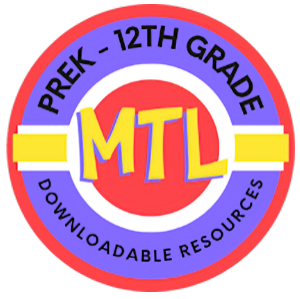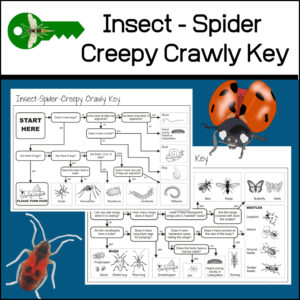Showing all 14 resultsSorted by latest
-
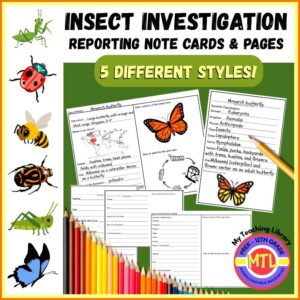 $3.00Buy Now
$3.00Buy NowStudying insects? Doing a unit on entomology? Give students a resource to help guide an investigation as well as report what they find!
This product includes 5 different styles of insect investigation note cards and pages making it adaptable for multiple grades/levels. Depending on the information that you want students to gather and report, choose the appropriate style for the assignment. Once given the note card or page, the topics on each will help guide students as to the information they need to find and complete!
Details:
Style 1: (1/2 page note cards – 2 per page) Name of insect, habitat, diet, stages of the life cycle, role in the ecosystem and an interesting fact. Students will also draw a picture of the insect.
Style 2: (1 page) Name of insect, description, where in the world (map given to complete), habitat, diet, role in the ecosystem and an interesting fact. Students will draw a picture of the insect as well as draw and label the life cycle.
Style 3: (1/2 page note cards – 2 per page) Name of insect, scientific classification, habitat and diet. Students will draw a picture of the insect.
Style 4: (1 page) Name of insect, scientific classification, where in the world, habitat, diet, role in the ecosystem. Students will draw a picture of the insect as well as draw and label the life cycle.
Style 5: (1/4 page note cards – 4 per page) Name of insect, habitat, diet, stages of the life cycle, role in the ecosystem and an interesting fact. Students will also draw a picture of the insect. -
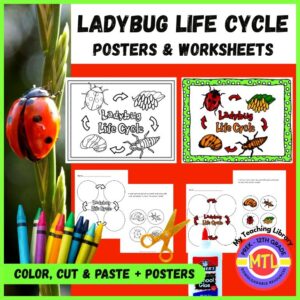 $2.50Buy Now
$2.50Buy NowA great resource to display and to get students hands-on putting together their own life cycle of the ladybug!
⭐Benefits of this resource:
- -Low prep – print and use/
- -Children learn about the ladybug life cycle both visually (poster) and in a fun and hands-on way as they color, cut and glue (worksheets).
- -Can be used to introduce the life cycle, or as a review/assessment to check understanding.
- -Encourages fine motor/scissor skills and sequencing.
- -Differentiated can be achieved by deciding if students are allowed to have the poster as a reference when completing their own life cycle.
- -Finished worksheets can be inserted into an interactive notebook.
⭐What else is included?
- -2 Life cycle posters (Color and Black/White) You can always allow students to color the b/w poster and keep.
- -2 student pages (worksheets). Students will color and cut out the 4 stages of the ladybug life cycle from the first page and glue in the correct sequence on the second page.
-
Sale!
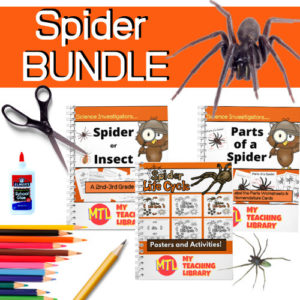 Buy Now
Buy Now$7.00Original price was: $7.00.$6.00Current price is: $6.00.This Science bundle will give you what you need to teach your students about spiders!
It includes 3 complete resources! (See description below for all the details)
-
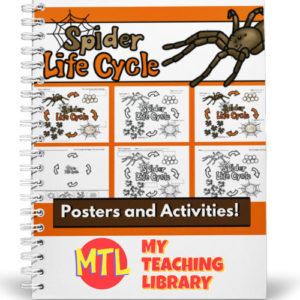 $2.00Buy Now
$2.00Buy NowWant to study the life cycle of a spider? Here is a resource for you!
Includes:
– 2 labeled posters (color and b/w)
– life cycle coloring page
– colorful center activity
– 2 cut-n-paste worksheetsUse as a standalone resource or combine with:
-
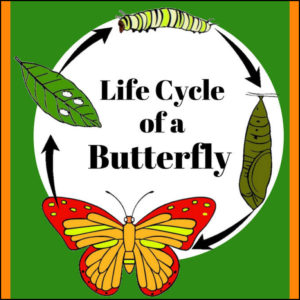 $1.75Buy Now
$1.75Buy NowThis Science resource will teach students the Life Cycle of a Butterfly and includes:
- * 2 color posters of the life cycle (1 with added details)
- * 1 b/w poster (for students to color),
- * 4 picture/information cards for each stage of the life cycle
- * 3 life cycle worksheets
-
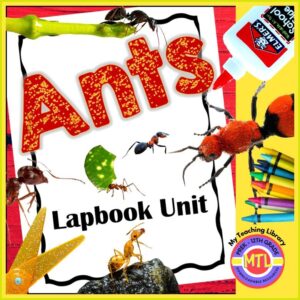 $7.00Buy Now
$7.00Buy NowStudents love studying insects and the ‘common’ ant may not seem so common after this unit where they will learn all about ants! Ants have some unique capabilities and there are more than 10,000 known ant species around the world. This resource is an interactive, hands-on Science project that will engage your classroom in student centered learning.
🐜During the process, students will learn about…
- – Life Cycle of an Ant
- – Types of ants
- – Social structure of an Ant Colony
- – Food and Habitat of Ants
- – Ant Communication
- – Ant Predators
- – Positive and Negative Ecosystem Impact of Ants
- – Anatomy of the Ant…and more!
After completion, students will have a beautiful 3D project to keep. Projects can be individual or you can assign as a cooperative learning activity.
🐜 Includes:
- Informational text about ants (life of the ant, communication, food, appearance, anatomy, habitat and more)
- Posters and diagrams of life cycle and ant anatomy
- Flash cards of 15 different types of ants (pics and information)
- Fun fact cards
- Suggested vocabulary (with definitions)
- Templates for project
- Template instructions / Project instructions
-
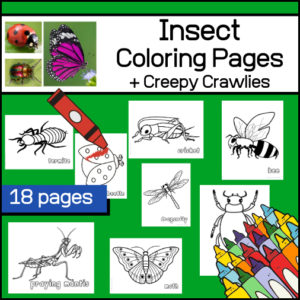 $2.50Buy Now
$2.50Buy NowThis resource is a print and go resource offering 18 coloring pages of insects plus a couple creepy crawlies! Each page has a large picture to color and the name of the ‘bug’ in font that are also ready to color.
-
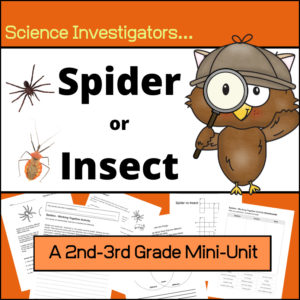 $3.00Buy Now
$3.00Buy NowSpiders vs Insects – Science Investigator Mini-Unit has been designed to teach 2nd & 3rd grade students about the differences between these creepy crawlies!
This resource includes 2 levels of informational text (for differentiation) – reading comprehension questions for both, a couple drawing and labeling activities, a Venn diagram (compare and contrast), a crossword puzzle, a cooperative group (or partnership) activity and a short opinion essay question. Answer Keys are provided.
-
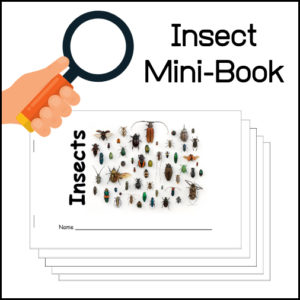 $2.00Buy Now
$2.00Buy NowHelp your students learn about insects with their very own 12 page mini-book! This is a perfect tool to use as a study aid as it includes important facts about insects such as…the four things all insects must have: 3 body parts, 2 antennae, 6 jointed legs and an exoskeleton. This little book will also give examples of creepy crawlies that are not insects, how some insects have 1 or 2 pair of wings, how some are helpful and some are harmful. At the very end of the book, students are asked to draw their favorite insect.
-
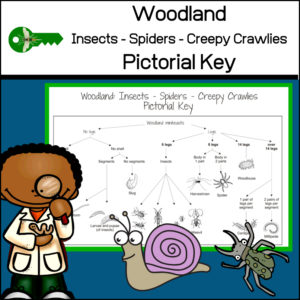 $1.25Buy Now
$1.25Buy NowStudents love entomology! What is that bug? Some may use the term MINI-BEAST. Is it an insect, a spider, a slug? “I found this bug in the woods, but what is it called?” To help answer student questions like these, here is an easy to use PICTORIAL IDENTIFICATION KEY!
Woodland minibeasts included on this picture guide: snail, worm, larvae (pupae), slug, beetle, earwig, aphid, weevil, harvestman, spider, woodlouse, centipede and millipede (all common creepy crawlies found in the woods)
-
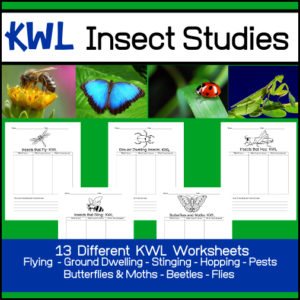 $3.00Buy Now
$3.00Buy NowWant student to investigate a variety of different types of insects? This K-W-L resource includes 13 different KWL worksheets so that students (individually or in cooperative groups) can use as they study different bugs and creepy crawlies. Perhaps they want (or you want) the focus to be on insects that hop or ground dwelling insects. What if their study should focus on beetles only or butterflies and moths? Not only will you get worksheets for a variety of specified ‘types’ of insects but I’ve also included some that can be tailor designed to what you or your students choose to study!
-
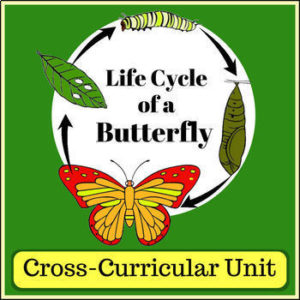 $4.00Buy Now
$4.00Buy NowButterfly Life Cycle Unit is a 49 page cross-curricular unit offering Language Arts, Science, Math and Art activities! By the end of your study, students will know all about the life cycle of the butterfly.
What is included? Puzzles, posters, worksheets (for tracing, matching, coloring, and completing the life cycle), coloring pages, songs, life cycle mini-book (for students to complete) and even a craft project.
-
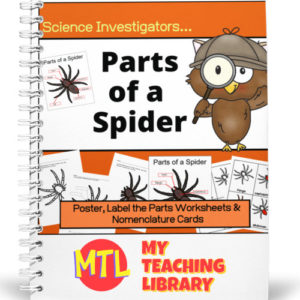 $2.00Buy Now
$2.00Buy NowHelp students learn the parts of a spider with this fun arachnid resource! Students will learn the following parts: eyes, fangs, cephalothorax, abdomen, spinnerets, legs.
Includes:
- – Color poster
- – 2 Worksheets – One for students to write and label, the other to cut and paste.
- – 1 Science Center activity
- – Nomenclature flashcards – Labeled
- – Blank Cards for students to complete
